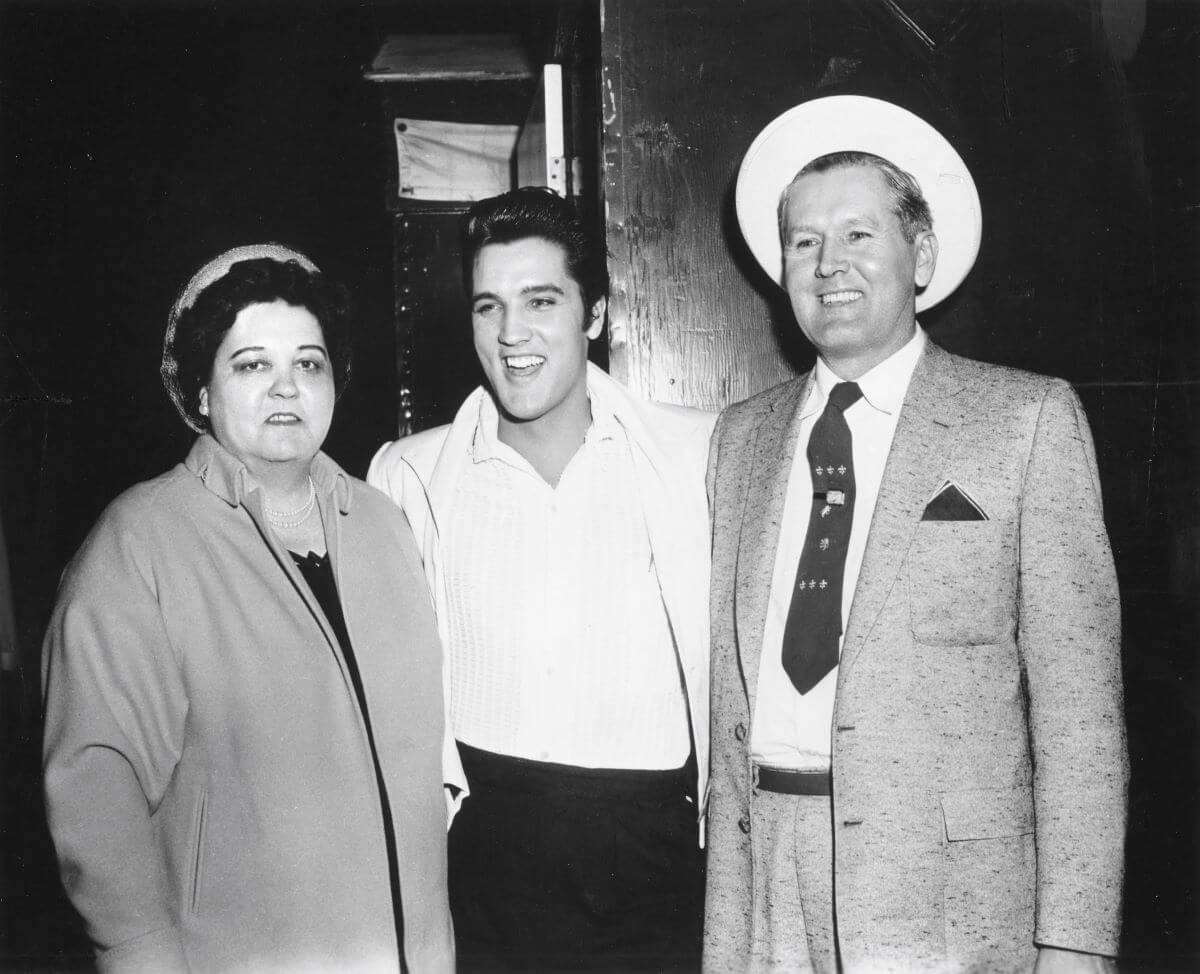What shaped Elvis Presley's cultural identity? A look at his roots reveals a complex and multifaceted heritage.
Elvis Presley's ancestry is a fascinating blend of various ethnicities. His family heritage predominantly includes English, Scottish, Irish, and German roots. While these influences are notable, significant African American ancestry is documented, contributing to a complex tapestry of cultural influences that shaped his unique musical and personal expression.
Understanding Presley's heritage provides insights into the cultural melting pot of the American South in the mid-20th century. The presence of African American music within his family and broader community had a profound impact on his musical development and style. This understanding deepens our appreciation for his career and creative evolution, demonstrating how musical traditions across different ethnicities often intersect and intertwine. Acknowledging this diversity also challenges stereotypical interpretations of race and culture during that period.
| Ancestor | Ethnicity | Notes |
|---|---|---|
| Parents | Mixed European heritage; with some African American ancestry | Details on specific ancestral lines and ethnic blends are complex and not always precisely documented. |
| Grandparents | Varied, tracing to England, Scotland, Ireland, and possibly other European countries | Genealogical research continues to refine these details. |
This exploration of Presley's background serves as a prelude to a deeper investigation into the role of race and cultural identity in American music. Understanding Presleys influences allows for a nuanced appreciation of the evolution of rock and roll.
Elvis Presley's Ethnic Background
Understanding Elvis Presley's ethnic background offers a window into the complex cultural forces shaping his career and musical style. This examination reveals a blend of influences, challenging simplistic portrayals of racial and cultural identity in American society.
- Diverse Ancestry
- African American Influence
- Southern Roots
- Musical Evolution
- Cultural Melting Pot
- Historical Context
Elvis's ancestry encompassed English, Scottish, Irish, and German roots, alongside African American heritage. This blend, a reflection of the Southern cultural tapestry, suggests a multifaceted musical development. The presence of African American music traditions profoundly shaped his style, moving beyond a singular ethnic framework. Elvis's career intersected with the evolving cultural landscape of the 1950s and 60s, showcasing how musical traditions often blend and cross. His work became a product of this merging, a powerful example of artistic cross-cultural exchange.
1. Diverse Ancestry
Elvis Presley's ethnic background is characterized by diverse ancestry. This multifaceted heritage, encompassing English, Scottish, Irish, and German roots alongside African American influences, significantly shaped his identity and artistic expression. The intricate blend of these traditions resulted in a unique musical style that transcended traditional categorization, incorporating elements from various cultural backgrounds.
The presence of African American ancestry in Presley's family and community was crucial. Exposure to African American musical traditions, particularly gospel and blues, heavily influenced his distinctive vocal style and instrumental choices. This wasn't a singular or isolated influence, but rather a component of a broader cultural exchange in the American South, where such traditions often intertwined. Presley's music became a powerful embodiment of this cross-cultural exchange. Examining the diverse ancestry allows a more accurate understanding of the sociocultural environment surrounding his career, enabling a nuanced analysis of his evolution as an artist.
Understanding Presley's diverse ancestry challenges simplistic portrayals of racial and cultural identity. It highlights the complex interplay of influences in the formation of artistic styles and the realities of social and cultural blending in American history. Recognizing the multilayered nature of Presley's background provides a more comprehensive understanding of his impact on music and culture, revealing a legacy that reflects the diversity of American society.
2. African American Influence
Elvis Presley's ethnic background, characterized by a complex blend of European and African American heritage, reveals significant African American influence on his musical development. Understanding this influence is crucial for comprehending the evolution of his style and the broader cultural context in which he emerged.
- Gospel Music's Impact
Presley's exposure to gospel music, a predominantly African American tradition, profoundly shaped his vocal delivery and emotional expressiveness. The powerful vocals, call-and-response patterns, and intensely personal lyrics of gospel music resonated deeply within his artistic sensibilities. This influence is evident in his passionate performances and the emotional range within his songs.
- Blues as a Foundation
The blues, another cornerstone of African American musical tradition, laid the groundwork for Presley's distinctive vocal techniques and rhythmic phrasing. His ability to convey a range of emotions, from yearning sadness to raw intensity, drew heavily from the blues' expressive vocabulary. This is apparent in his unique delivery style and the emotionally charged delivery within many of his songs.
- Rhythm and Blues' Rhythmic Innovation
The dynamic rhythms of rhythm and blues (R&B) played a significant role in the development of Presley's energetic stage presence and the driving force behind his music. The fast tempo and complex rhythmic arrangements characteristic of R&B music are observable in Presley's songs and performances. This influence is a key component of the "rock and roll" sound he helped to create.
- Cultural Exchange in the South
The South, where Presley grew up, served as a crucible for the interaction and fusion of African American and white musical traditions. This cultural exchange, often undocumented in detail, was a vital part of the musical landscape that Presley absorbed. Understanding this shared musical environment reveals the contextual influence on Presley's creativity.
In conclusion, Presley's ethnic background, particularly its African American components, was instrumental in shaping his musical style and artistic expression. The fusion of various musical traditions, fostered by cultural exchange in the American South, contributed significantly to the unique sound and impactful performances that made him a cultural icon. This understanding highlights the complexity of artistic development and the interplay of cultural influences in the creation of popular music.
3. Southern Roots
Elvis Presley's upbringing in the American South profoundly shaped his artistic development and, consequently, his musical identity. The region's unique cultural landscape, characterized by a blend of European and African American traditions, provided a fertile ground for the fusion of musical styles. This fusion is a significant component of Presley's ethnic background. The South's cultural exchange, often characterized by close proximity and frequent interaction between different racial groups, provided an environment where musical forms could overlap and inspire innovation.
Specific examples illuminate this connection. Presley's exposure to African American music, particularly gospel, blues, and rhythm and blues, was integral to his musical development. These genres, prevalent in the Southern communities where he lived, profoundly influenced his vocal style, emotional expressiveness, and rhythmic sensibilities. His ability to blend these traditions with his own family's musical heritage contributed to the unique sound that came to define rock and roll. The familiarity with diverse musical expression, a hallmark of the Southern experience, is evident in Presley's music, which transcended racial boundaries, reflecting the complex social fabric of the region.
Understanding the significance of Southern roots in Elvis Presley's ethnic background is vital for several reasons. It allows for a more comprehensive appreciation of the interplay between cultural exchange and artistic evolution. It highlights the often-unseen contributions of marginalized communities to the development of mainstream musical styles. Further, it dispels simplistic notions of racial homogeneity in the South, acknowledging the complex interplay of cultures that shaped the region's unique musical identity. This nuanced perspective on cultural exchange contextualizes Presley's impact on music, enabling a deeper understanding of his legacy and its importance within American popular culture.
4. Musical Evolution
Elvis Presley's musical evolution was intricately linked to his ethnic background, a tapestry woven from diverse cultural threads. The blending of musical traditions shaped his distinct style, influencing not only his own career but also the development of rock and roll and popular music as a whole. This exploration examines key facets of this connection, highlighting the profound impact of Presley's heritage on his artistic trajectory.
- African American Musical Influence
Presley's exposure to African American musical genres like gospel, blues, and rhythm and blues was pivotal. His ability to seamlessly incorporate elements of these styles into his own performancesvocals, instrumentation, and rhythmic phrasingdemonstrated a profound understanding and appreciation of diverse musical traditions. The profound influence of these genres is evident in the raw emotional expressiveness and dynamic rhythms characteristic of his work.
- Southern Cultural Exchange
The Southern United States acted as a crucible for the merging of African American and European musical traditions. Presley absorbed these fused influences, resulting in a unique sound that transcended racial boundaries. His ability to connect with audiences across racial lines was, in part, a reflection of the musical fusion that permeated the Southern cultural landscape. This fusion is clearly seen in the blend of gospel fervor and country instrumentation found in his early recordings.
- The Shaping of Rock and Roll
Presley's artistic interpretation of these diverse musical traditions contributed significantly to the genesis of rock and roll. His integration of bluesy vocals, gospel-infused intensity, and rock instrumentation fundamentally altered the landscape of popular music, establishing a new sound rooted in both novelty and emotional resonance. The impact of this fusion is clearly demonstrated by the wide-reaching appeal of his music and the influence it had on subsequent generations of musicians.
- Beyond the Boundaries of Race
Presley's success transcended racial barriers, solidifying his place as a cultural icon. This success was partly due to his musical ability to bridge cultural divides and connect with audiences across racial lines. His musical contributions can be viewed as a testament to the power of cultural fusion to transcend societal divisions and foster understanding through shared artistic experiences.
In conclusion, Elvis Presley's musical evolution was a direct response to his complex ethnic background. His capacity to absorb, interpret, and synthesize musical stylesparticularly the African American traditions prevalent in the American Southnot only defined his artistic career but also fundamentally shaped the evolution of popular music, contributing to a more integrated and diverse soundscape.
5. Cultural Melting Pot
Elvis Presley's ethnic background provides a compelling case study of the "cultural melting pot" concept. His musical style, profoundly influenced by the blending of African American and European traditions, exemplifies the dynamic interplay of cultural exchange within American society. Understanding this process is essential to comprehending Presley's impact and the broader historical context of American popular music.
- African American Influence
Presley's musical style drew significantly from African American traditions, including gospel, blues, and rhythm and blues. This incorporation wasn't merely a borrowing but a genuine absorption and transformation of these genres. His music became a vehicle for the dissemination and popularization of African American musical forms, highlighting the dynamic interplay between cultures.
- European Heritage as a Foundation
Presley's European-American heritage also formed an essential part of his musical identity. Elements of country and other traditional European genres were incorporated, creating a unique fusion. This demonstrated how different cultural strains could intertwine and influence one another, generating something new and distinct from the original ingredients. The combination demonstrates the creation of a "cultural hybrid" through this fusion.
- Southern Cultural Exchange
The American South, where Presley grew up, served as a crucial context for this cultural exchange. The close interaction between African American and European-American communities fostered a rich and complex musical environment where diverse traditions converged and intermingled. This process, common in many American regions, generated unique forms of artistic expression that eventually found their way into mainstream culture.
- Impact on Rock and Roll
Presley's fusion of musical stylesa quintessential example of the "cultural melting pot"played a critical role in the emergence and evolution of rock and roll. His music transcended racial barriers, connecting with audiences across different backgrounds. This exemplifies how a willingness to incorporate and blend varied cultural influences can lead to something wholly original and influential, changing cultural landscapes.
Elvis Presley's background underscores the importance of acknowledging cultural blending in artistic development. His legacy serves as a testament to the richness that emerges when diverse traditions intertwine. The "cultural melting pot" phenomenon, while not without its complexities, is clearly evident in Presley's music and illustrates the dynamic and evolving nature of American culture. His success demonstrates the potential for creative evolution that arises from a society where different cultural elements interact and transform each other.
6. Historical Context
Elvis Presley's ethnic background, characterized by a complex blend of European and African American ancestry, must be understood within the historical context of the mid-20th-century American South. The social and cultural dynamics of the era profoundly shaped the experiences and opportunities available to individuals with mixed heritage. Segregation, while legally enforced in many areas, didn't entirely erase cultural interaction. Communities often exhibited a complex reality where cultural exchanges, often informal and sometimes subtle, were commonplace. This context influenced not just Presley's musical development but also his reception and the impact of his artistry.
The racial tensions and social inequalities of the time are crucial to consider. Presley's blend of influences, particularly the integration of African American musical forms (gospel, blues, R&B) into his performance style, was not without its complexities. While his music transcended racial boundaries and achieved immense popularity, it also existed within a framework of racial discrimination. His success challenged existing social norms but did not immediately dismantle them. Examining this historical context allows a nuanced understanding of the challenges and triumphs inherent in this cultural fusion. Examples include the reception of his early recordings, which initially faced resistance from some segments of the public. Additionally, the segregation in performance venues and the limited opportunities available to African American musicians during this era require analysis alongside Presley's success. Understanding these factors helps unravel the intricate interplay of race, music, and societal norms.
Recognizing the historical context surrounding Elvis Presley's ethnic background provides a more complete picture of his life and career. It reveals the complex interplay of cultural forces that shaped his musical evolution and his impact on American popular culture. This understanding is essential for appreciating the nuances of the historical period and the lasting impact of Presley's work. Further, by considering the social and political climate of the time, it is possible to evaluate the implications of his work within a specific cultural moment. This approach fosters a critical and informed perspective on his legacy and the role of race and culture in shaping American history.
Frequently Asked Questions about Elvis Presley's Ethnic Background
This section addresses common questions regarding Elvis Presley's heritage and its influence on his life and work. Answers are based on available historical and genealogical data.
Question 1: What were the primary ethnic influences in Elvis Presley's background?
Elvis Presley's ancestry was complex, incorporating a mix of English, Scottish, Irish, and German roots. Crucially, significant African American ancestry is documented, contributing to a multifaceted cultural heritage. This blend, reflective of the American South's cultural landscape, was instrumental in shaping his unique musical style.
Question 2: How did African American musical traditions impact Elvis Presley's work?
Elvis's exposure to gospel, blues, and rhythm and blues profoundly influenced his vocal style, performance energy, and instrumental choices. He successfully integrated elements of these African American traditions into his performances, demonstrating a significant understanding and absorption of diverse musical forms.
Question 3: Did Elvis's background have a significant impact on his career?
Yes, the combination of European and African American musical influences shaped his distinctive sound. This unique style resonated with a broad audience, contributing significantly to his popular appeal and the emergence of rock and roll as a distinct genre. His blend of cultural influences was not isolated but integral to the cultural fusion of the time.
Question 4: How did Elvis Presley's Southern upbringing affect his musical style?
The cultural landscape of the American South played a critical role in shaping Presley's career. The region's unique social environment allowed for and encouraged the exchange of musical ideas between European-American and African American communities. This environment provided fertile ground for the musical fusion that characterized Presley's work.
Question 5: How is the study of Elvis Presley's heritage important today?
Understanding Presley's background sheds light on the complex interplay of race and culture in American history, particularly during the mid-20th century. It underscores the significance of cultural fusion and cross-cultural exchange in artistic development, challenging simplistic portrayals of cultural homogeneity. Examining his background encourages a more comprehensive understanding of the development of popular music genres like rock and roll.
In conclusion, Elvis Presley's ethnic background was a crucial component of his musical evolution and cultural impact. The multifaceted influences, deeply rooted in the American South's unique cultural tapestry, shaped his distinctive sound and contributed to the wider evolution of popular music.
Next, we will delve into the specific musical genres that heavily influenced Elvis's career.
Conclusion
Elvis Presley's complex ethnic background, encompassing diverse European and African American influences, profoundly shaped his musical identity and artistic trajectory. The integration of gospel, blues, and rhythm and blues elements into his performances, alongside his European musical heritage, generated a unique sound that transcended racial boundaries. This fusion, born from the cultural landscape of the American South, ultimately defined rock and roll and continues to resonate in popular music today. The interplay of these various cultural streams within Presley's background underscores the complex historical realities of cultural exchange, demonstrating how the mixing of traditions can create new forms of expression. Examining Presley's heritage offers valuable insights into the sociocultural dynamics of the mid-20th century American South and challenges simplistic notions of racial homogeneity in art and culture.
Further exploration of Elvis Presley's artistic legacy necessitates a nuanced understanding of his ethnic background, not merely as a biographical detail but as a crucial factor in the evolution of American popular music. By recognizing the multifaceted influences that shaped his work, a more comprehensive appreciation of his artistry and its impact on subsequent generations of musicians and listeners can be achieved. This requires acknowledging the rich tapestry of cultural exchange that characterized the time and the continuing relevance of these historical processes in the contemporary world.


